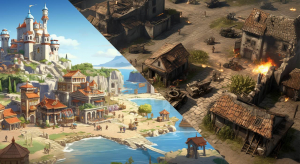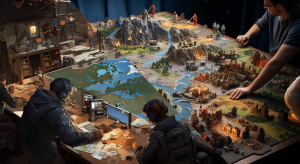Irrespective of age, gender, and class- video games have steadily become a popular mode of entertainment. For some, it is a relaxing hobby. Others are passionate about gaming. There is a wide variety of game genres- each with its own fanbase.
Among these, strategic games and tactical games have earned a significant place for gamers. Both these game genres test the players’ intelligence and strategic thinking. Often they are confused as the same. There are a few fundamental differences between the genres.
Read on to learn the subtle tactics vs. strategy game differences. These differences are the reasons behind a separate fanbase for both these genres.
As the name suggests, a strategic game is a genre where players consider a long-term strategy to make decisions that influence the course of the game. Such games test the players’ skills to make informed decisions. Such games do not generally rely on random chances or luck for their outcomes. There are several types of strategic games that game development companies can design for you. The basic foundation of this sub-genre remains the same. But, there are a few differences as well. RPG games, war games, and turn-based strategy games are some of the popular sub-genres.
Here are some of the genres of strategy games which are extremely popular:
This is a subgenre of strategy games that is generally time-based. Players use various resources to build their defense and defeat the opponent. Players must carefully consider the next stages without worrying about the action of the opponent.
This is a type of strategy game where you must take turns and make the move. It is similar to a turn-based tactics game. This game genre requires a proper strategy to manage the resources and build an empire that is strong enough against the enemies. This is also a timed game genre and hence players must be quick with their decisions.
This is another subgenre of strategy game. It depends largely on analytical, tactical, operational, and strategic practices. Wargaming can be classified as strategic as well as tactical game depending on the game mechanism. It is a great way to sharpen your mind and improve your analytical skills.
This is a strategy game where a single player defends a specific location and the resources from the opposition. This is done by building different structures to stop the opponents’ movement.
Multiplayer online battle game or MOBA is a role-playing strategy game. The only aim of the game is to win the battle against your opponent.
This type of strategy game allows extensive control of the empire to the players. The player can control the war strategy, government, agriculture, and research. The high flexibility allows players to strategize their gameplay accordingly.
Strategy role-playing games combine elements of strategy games with role-playing. Players can assume the character they want and create a strategy through the gameplay.
This type of game copies various elements of real life and simulates the elements in the game. Such games are often used for various purposes like training, analysis, prediction, and so on.

Strategy games are characterized by specific and unique features. However, there can be overlapping among different game genres too. However, a strategy game will have almost all the following features:
Strategy games derive various themes from certain basic activities like conquest, trading, and exploration. The blend of these activities creates the foundation of the game. The dominance of either of these activities makes the game unique.
Gathering and managing resources like wood, gold, minerals, and so on. These are used for building training units, structures, and so on in the game.
Players can explore the game world and come across more areas to conquer. Some strategy games revolve primarily around exploration which goes hand-in-hand with conquest.
Another crucial aspect of the game is economy management. Expenditures, balanced resource production, and investments altogether help with growth and development in the gameplay.
This is another unique feature of strategy games, especially wargames. This feature helps you gain resources, strategic advantages, and bonuses useful in the gameplay and to strategize.
There is usually a moderate tactical combat element in strategy games though it is not as intense as it is witnessed in pure tactical games. Positioning, flanking, and similar tactics are witnessed in strategy games.
Occasionally random elements get incorporated into strategy games. Such games have procedurally generated maps and events. It improves the replayability and strategic element of the game.
Tactical video games emphasize strategizing, planning, decision making and accurately executing all actions within the controlled gameplay. It is a type of strategy game but has a few unique features that set it apart. For starters, short-term accomplishments in such a game hold more value. Tactics are required on a short-term basis as the requirements keep changing with every stage as we witness in games like Innovation and King of Tokyo. This genre combines the core elements of role-playing video games and tactical games. The players are presented with scenarios where they must navigate the challenges using the resources and characters in the game. Strategic planning, unit control, challenge, and complexity are some key features of a tactical game.
There are several types of tactical games. Several of these gaming genres are very similar to strategy games genres too. The following are some of the tactical game genres:
It is a subgenre of strategy games that are played in real-time simulation. It is primarily witnessed in operational warfare and military tactics games. The game is not played in turn but all players can participate together in real time.
Players take turns to make the strategic moves in the game in TBT. Every player must have strategic planning and decision-making capabilities to overcome the different challenges.
Tactical combat and role-playing game elements are combined to create a tactical RPG. The players control characters with unique abilities. It involves understanding the weaknesses and accordingly strategizing the gameplay.
Such games emphasize stealth tactics specifically to overcome the challenges. Players must plan and strategize their movements and actions stealthily to complete their missions.
These types of games require puzzle-solving skills and tactics. Certain board games like chess a classic examples of tactical puzzle games. The puzzle-solving strategies are useful to reach a specific goal in the gameplay.
Tactical combat game elements and first-person or third-person shooter game elements are combined to create this genre. The gamer controls a group of players with different abilities. They have to be strategically coordinated to achieve a common objective.
The subtle line between strategy games and tactical games occasionally causes overlap in their features. The primary factor that sets apart tactical games is the need to rely on tactics more than strategy while playing. The following are some of the features that set apart tactical games:
Strategy games that include diplomacy mechanics that let players engage in alliance and tactfully handle agreements with other factions to reach their goals.
The players have to conquer and manage the territories in the game to earn resources and strategic advantages. Tactical games are designed to create an environment that calls for a deliberated tactical approach to achieve this.
Players must deploy their units tactfully to defeat the opponent and this is occasionally the primary focus of the game.
In these types of games, the players have to build and upgrade buildings which will be later used for different purposes in the gameplay. This can include resource gathering, defense, and unit production.
Strategy games often feature different civilizations and factions with unique traits. Players can experiment with different strategies as a result.

Strategy and tactics are often used interchangeably. However, they are not the same things. At the same time, strategy and tactics are not mutually exclusive. Tactics video games are a segment of strategy games. The major characteristics that set apart tactics games are the short-term goals.
Unlike strategy games where players must make the decisions keeping in mind the long-term impact on the gameplay, in tactical games players must use immediate tactics to solve each level.
Here are some of the basic strategy vs. tactics games differences you must know about:
There is a broad scope of strategy gameplay. It is complex and often players have to manage strategizing for an entire civilization and building it. Players have to strategize the defense, alliance, and even resource-acquiring and management in such games.
In tactical games, the scope is narrow. The players mostly have to encounter small battles and short-term encounters. The scope of tactical games is smaller and the challenges are short-term.
Both strategy and tactical games are time-bound or the gameplay must be completed within a specific period. In the case of strategy games, the period is much longer. Any kind of action or decision must be taken while remembering they will have a long-term impact on the outcome of the gameplay.
In the case of tactical games, the time scale is much shorter. The actions must be taken quickly to win each of the stages in the game. They generally do not have a long-term impact on the course of the gameplay.
The resource management element is particularly prominent in strategy games. Especially in wargames or real-time strategy, strategy games depend largely on resources to gain an advantage.
In tactical games, the need for resource management is crucial but it is not as prominent a factor in such a game as it is a necessity in strategy games.
Strategy games require controlling larger factions and even armies for the gameplay progress. The players often have to build civilizations, forts and win wars in a true strategy game that calls for such large-scale unit control.
In tactical games, the emphasis is on controlling individual units or smaller squads. The aim is to overcome short-term challenges with tactics based on solving puzzles and other tactical challenges.
5. Decision Making
In strategy games, the players must focus on long-term planning and global strategy. The decisions at every stage of the game affect the eventual outcome of strategy games. Hence, players must have critical thinking and analysis skills to complete the game.
Players focus on immediate tactical combat and approach to solve the present puzzles and problems in the tactical games. They do not have to consider deeper decisions or long-term strategies while playing tactical games.
In strategy games, the combat style is elaborate, with battle and strategies that are much more complex. As a result, the players must think ahead and come up with viable strategies to manage such a large-scale army.
Players have to make immediate decisions in the tactical games. The gameplay is action-oriented and players must focus on the combat elements to win.
Strategy games can be slower comparatively because of the larger scope and complex gameplay. Usually, the storyline is vast which occasionally has some ups and downs leading to slow-paced game progress at times.
Tactical game is comparatively fast-paced because the progress of the game does not depend on the long-term impacts of the players’ actions. Players must take immediate tactical actions that propel the game faster.
The primary skills required macro-management and long-term planning and strategy. As a result, the players must have clarity and deep thinking to overcome the challenges in the game.
In tactical games, the on-spot decision-making skill is a necessity. Tactical decision-making and micro-management are crucial to overcome the challenges in such games.
On many occasions, strategy game and tactical game features can overlap. The features of strategy and tactical games are often very similar. Tactical games are a subgenre of strategy games. But few subtle differences set apart the tactical games. The above-mentioned are some of the differences that help to tell apart the games.
Juego Studios can become your one-stop game development company for all types of video games. We can create all types of strategy and tactical games. Make your projects a reality with our help. From mobile game development services to AAA games- we can help create all of them.